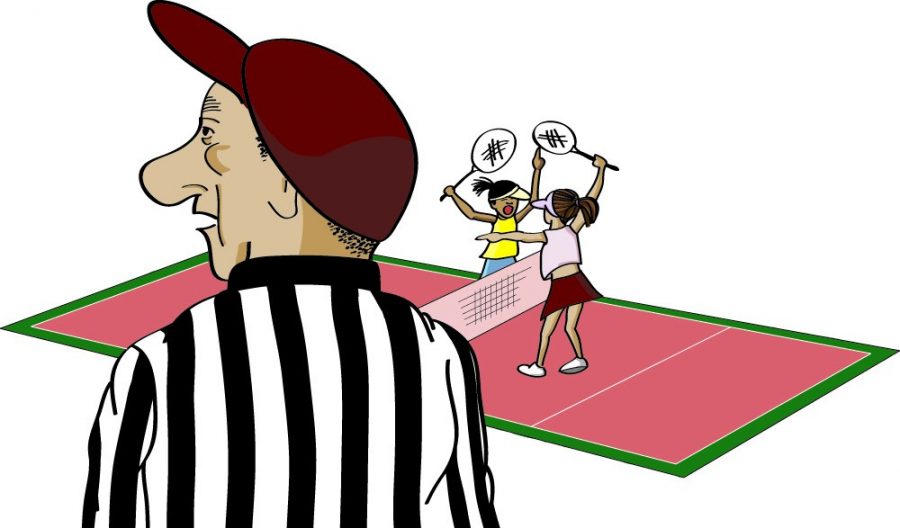Self-refereed tennis matches cause controversy
Illustration by Maria Otto ‘17
It was match point. Bucknell’s No. 1 singles player awaits the serve from Lafayette junior captain Brandon Goldstein.
Following his return, Goldstein steps into the ball, rips it down the line, and is satisfied that there’s no chance of a return from his opponent. Immediately, he hears, ‘OUT!’ from the far end of the court.
“No way it was out,” Goldstein said. “But the line judge was not on our court so there was nothing I could do but accept the call.”
According to the Intercollegiate Tennis Association, a tennis official is defined as someone who “helps ensure that any given tennis match is conducted under the fairest possible conditions.” However, without officials like line judges present on every court, singles players are put in the position of making their own calls.
The situation allows players a great deal of latitude. Too much, in Goldstein’s view.
“Kids cheat and call shots out when they are in,” he said. “There is really nothing you can do. Especially on the last point.”
“Not having a line judge only has an effect on the game if people are cheating or not making fair line calls,” sophomore Catherine Senopoulos said. “Unfortunately this happens almost every match. Tennis is played by an honor code, but most college players forget that when they walk on the court and just focus on winning.”
Host teams are responsible for hiring officials. However, the funds granted to them by their athletic departments are limited, preventing them from hiring enough umpires and line judges to manage every match.
“We pay for our umpires out of our budget. The cost of the umpires is determined by the distance of travel and length of the match,” head coach Eric Ratchford said. “Ideally, we would have a chair umpire per court, but that isn’t the case here.”
In some leagues, tennis matches are overseen by a full complement of officials. However, every league has its own individual requirements, and the Patriot League is no exception.
“Take the SEC,” Ratchford said. “They are going to have a chair umpire for every match. The [Patriot] League does not require it.”
“Some kids love to hook,” said one men’s player, who asked not to be named. “Hooking” is cheating on a line call. “There is even more of a likelihood that kids will hook their opponent after their opponent has hooked them. But that’s the only defense to getting hooked, to hook them right back.”
Of course, some mistakes are honest ones.
“People can’t always make perfect line calls,” Senopoulos said. “It is difficult to focus on playing the point and at the same time making close calls.”
Still, she said the tennis situation at many colleges is “pretty ridiculous, seeing as no other sport would even consider playing without a referee or an umpire.”




































































































